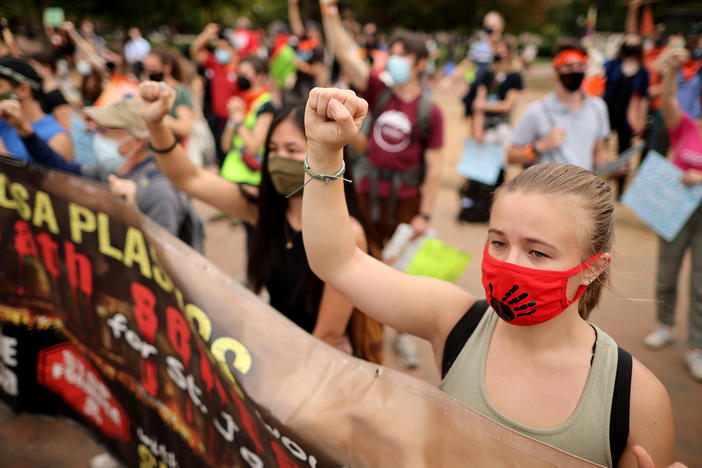Section Branding
Header Content
'How Fascism Works' Author On Trump's Attempts To Overturn Election Results
Primary Content
NPR's Leila Fadel speaks to Jason Stanley, author of How Fascism Works: The Politics of Us and Them, about President Trump's refusal to concede and his party's willingness to go along with it
Transcript
LEILA FADEL, HOST:
We begin the program with President Trump's latest efforts to overturn the results of a free and fair presidential election. This week, his personal attorney and the former mayor of New York, Rudy Giuliani, alleged widespread national voting fraud despite the fact that the campaign has lost more than two dozen legal challenges filed since Election Day, and there is no evidence of fraud.
Today, the Michigan Republican Party and Republican National Committee are requesting a delay to the certification process and an audit of the vote, a move the secretary of state and legal experts say is against state election code. President-elect Joe Biden won Michigan and has a lead there of more than 155,000 votes.
President Trump's conduct in recent weeks has been criticized by many as a subversion of democracy, even prompting some to denounce the moves as tactics of fascism. Jason Stanley's been warning about this since before the election. He's a professor of philosophy at Yale and author of the book "How Fascism Works: The Politics Of Us And Them." He joins us now.
Jason Stanley, welcome back.
JASON STANLEY: Thank you very much, Leila. It's good to be back.
FADEL: So, first, how do you make sense of what you're seeing now in terms of the president's refusal to concede and his party's willingness to go along with it?
STANLEY: So it was extremely disturbing to see the GOP official Twitter site retweet a video with the president's attorney claiming a massive conspiracy theory and fraud based on voting machines. That was tantamount to an endorsement by essentially the ruling party of these tactics.
As far as President Trump is concerned, he has had a clear plan to deny the results of the election, should they fall against him, for many months. He's been very clear about that plan. It was to use COVID denialism among his supporters to rack up a large lead on Election Day, declare victory on election evening, and then do the tactics that we are now witnessing. That plan didn't work. He didn't win on Election Day with the same-day voters, Election Day voters. So we're seeing desperate moves to overturn the election anyway.
FADEL: So remind our listeners why you say this is an example of fascist behavior.
STANLEY: So fascism is a cult of the leader who promises national restoration in the face of supposed humiliation by minorities, liberals and immigrants. He represents the cities as corrupt, filled with foreigners and disease, and the heartland as the true nation that he represents. And then he takes over a political party, transforms them into a cult of the leader and says only he can deal with the problem.
So we're - we've seen his election campaign focus on Black Lives Matter, on a minority social justice movement. We've seen him promise patriotic education in a second term - all sorts of tactics that we ideologically associate with far-right ultranationalism, i.e., fascism.
FADEL: And it seems like many Americans, evidence or not, are buying into the conspiracy theory that there is mass fraud.
STANLEY: Absolutely. The heart of fascist politics is the destruction of truth. Fascist politics is based on a friend/enemy distinction where your enemy's not a legitimate opponent. Your enemy is hiding terrible crimes, and you can't treat them as any kind of normal opponent. And this is the purpose of conspiracy theories like QAnon.
FADEL: When you were last on the program, you spoke about conspiracy theories, and you just mentioned being a core tenant of fascism, saying in part that they destroy an information space. We just mentioned Rudy Giuliani, the president's lawyer, echoing false claims of voter fraud this week. This is a claim that the president himself has said many times. But it has been widely debunked by major news organizations - even by the courts. Why do they persist?
STANLEY: They persist because that's the core of representing politics as militarized. Fascist politics transforms politics into a battlefield. And in the battlefield, like, you don't care if your opponent is speaking truth or not. They're the enemy. They want to kill you. So the goal is to represent politics as a battlefield. If your leader says false things, it doesn't matter. He's trying to win the battle, win the war for you. So that's the structure.
And then you delegitimize the media by connecting them to your opponent, saying it's one big conspiracy to undermine the nation, and then only you are the savior. Only you can save things. People have to have blind faith in you. And Trump has created that kind of connection between him and his supporters.
FADEL: Have we ever seen a president do the types of things that we're seeing right now - questioning the popular vote, claiming fraud when there is none?
STANLEY: I don't think so. I mean, I - this is a step beyond what we've seen before. And we knew Trump was going to do this. He's been announcing his plans to do this. But what concerns me most of all is the Republican willingness to go along with this - with what is, frankly, an absurd, conspiracy-laden package of nonsense.
So, yes, Trump is doing extreme damage to our democracy, but the worst is being done by one of our two political parties that is largely so far legitimating it, or at least refusing to stand up against it. And we can see what would have happened had the election been a little closer.
FADEL: So when you were last on the program, the election hadn't happened yet. And one of the points you made then was that our country's democracy, the U.S.'s democracy, was on life support. Now, of course, we don't know what's going to happen next, but what would it take to rebuild democratic institutions after this?
STANLEY: We need a responsible Republican Party and responsible conservatives that are committed to the rule of law and democracy. We need to challenge - we need to get out of this cycle of racial demagoguery. So we have large political protest against racial violence and injustice, and then we have demagogues using that to spread conspiracy theories about riots and corruption and lawlessness spreading from the cities.
And this is a cycle that we see again and again in U.S. politics. And it opens us up to extremely anti-democratic consequences of the sort that we are now witnessing.
FADEL: That was professor Jason Stanley. He's the author of "How Fascism Works: The Politics Of Us And Them."
Jason, thank you so much.
STANLEY: Thank you for having me on the program. Transcript provided by NPR, Copyright NPR.
Bottom Content



